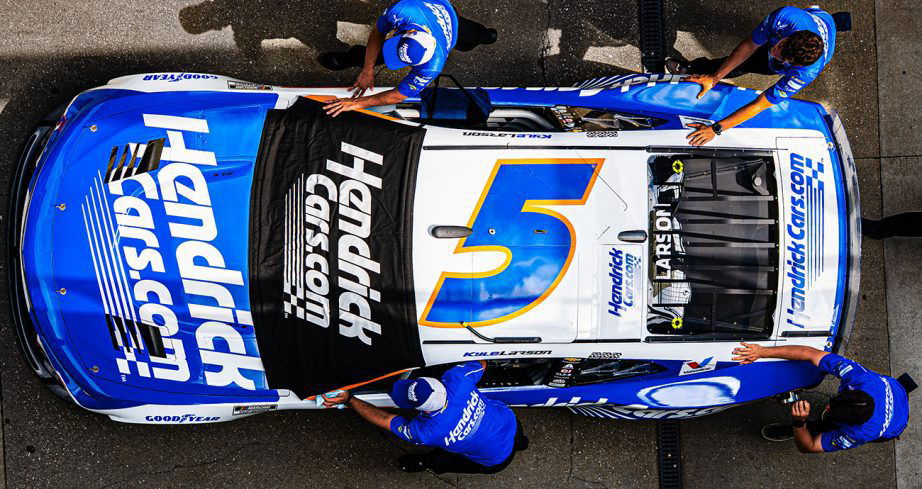
Imago
via NASCAR

Imago
via NASCAR
Since the 2015 season, NASCAR has steadily ratcheted down horsepower from roughly 900 hp in 2014, to 750 hp in 2015, then a steep drop to 550 hp in 2019, before modestly rising to 670 hp with the introduction of the Next Gen car in 2022. That gradual reduction has dulled the racing edge, stripping away off-throttle moments and driver nuance. With drivers now limited to around 670 horsepower, the action often feels homogenized, and both fans and competitors are growing weary. When Elton Sawyer stated that an increase is being considered but won’t arrive until 2026 at the earliest, fans saw less promise and more performance paralysis.
Watch What’s Trending Now!
Sawyer’s SiriusXM NASCAR Radio remarks suggested NASCAR agrees more horsepower is “the right move,” but only as a future possibility, and then selectively at certain tracks. Rather than making bold changes now, the sanctioning body is set to spend another season deciding where the bump might apply. Meanwhile, short tracks, once the proving grounds of driving talent continue to produce stale, single-file racing filled with long green-flag runs and minimal passing.
To truly grasp the stakes, consider the past: prior to 2015, Cup cars often crested 750 to 900 hp, forcing drivers to trim throttle, manage tire wear, and use finesse to gain positions. That power created meaningful passing opportunities, elevated racecraft, and punished mistakes. Today’s spec setup emphasizes parity over personality, leaving less room for drivers to showcase individual flair or innovate on race strategy.
This isn’t an isolated misstep, it’s part of a pattern. NASCAR has repeatedly opted for overly cautious solutions: from rigid aerodynamic packages to slow tire degradation, and now a multi-year wait for a horsepower restore. Fans aren’t just upset, they’re watching their sport’s soul be strangled by safety-first bureaucracy. With no tangible change until 2026 and then only at select venues, frustration across race-day conversations is boiling over.
Fans take the wheel on NASCAR’s horsepower hesitation
After NASCAR’s announcement, Reddit lit up with furious discussion from fans who’ve grown tired of the sport’s drawn-out decision-making process. From logic gaps to mechanical misunderstanding, the thread highlighted just how disconnected NASCAR leadership feels from its base.
The most straightforward frustration came from a fan who wrote, “Making it more complicated than it needs to be. Just increase it everywhere.” That sentiment reflects the impatience boiling across the community. To many, NASCAR’s approach feels like a masterclass in overthinking. Instead of evaluating which tracks might benefit from more power, fans believe it would be more cost-effective and competitively balanced to apply a universal horsepower boost, one that brings back raw racing without splitting engines across different specs.
But skepticism ran deeper as others questioned if this increase would even make a difference at all. One fan bluntly posted, “I’m not really sure what adding say 100 HP is going to do. All the engines are producing basically the same HP right now. If everyone has 100 HP the tires are all going to wear out around the same time. By the time they start to wear it’s time to pit because you’re halfway through a fuel run and halfway through the stage.” This take draws attention to NASCAR’s tendency to treat symptoms rather than root causes. A modest boost in power won’t matter if every other race variable remains static. Tire compounds, fuel strategy, and stage breaks must evolve too.
Still, some users highlighted a different, more nuanced benefit: driver skill differentiation. One Redditor explained, “It’s about handling, and making drivers have to lift off the gas on occasion. As for everything still being equal – that’s the whole point of this car. But if you make it just a bit harder to handle, that’s another opportunity for talent to separate itself.” In this view, it’s not about turning the races into horsepower wars it’s about restoring throttle management and cornering discipline. If drivers are forced to back off and make decisions, the cream will rise naturally, creating more organic battles on track.
The nostalgia-driven crowd, though, isn’t satisfied with halfway measures. One user said it loud and clear: “I know this will fall on deaf ears but unless they let the cars run at their natural 900 horsepower at every track except for the super speedways, we are not going to see much improvement.” For them, the issue isn’t just that the current 670 HP package is underwhelming it’s that it betrays the essence of what stock car racing was always meant to be: powerful, brutal, and punishing. Capping that energy has made the cars feel soulless and equalized to a fault.
But what really set fans off was the contradiction in NASCAR’s communication. One Redditor scorched the series by writing, “Earlier this year: ‘We’re not gonna sleep on this.’ Now: ‘This change wouldn’t happen until 2026 because we need to decide which tracks do increase HP on …. how about decide now and adjust as we go??’” The hypocrisy hit a nerve. While NASCAR assured urgency just months ago, its current plan feels like a masterclass in bureaucracy. Fans see right through the PR, especially when “quick action” turns into a two-year stall.
Horsepower has become NASCAR’s ultimate litmus test, not just for performance, but for leadership. What was once a thrilling arms race of engine builders and driver instinct has turned into a neutered numbers game. With the current 670 HP cap and no significant change on the horizon until 2026, fans aren’t just voicing discontent, they’re questioning the direction of the entire product. From Reddit to race-day forums, the call is clear: quit dragging your feet, quit spinning the PR, and give the fans a car worth watching.



